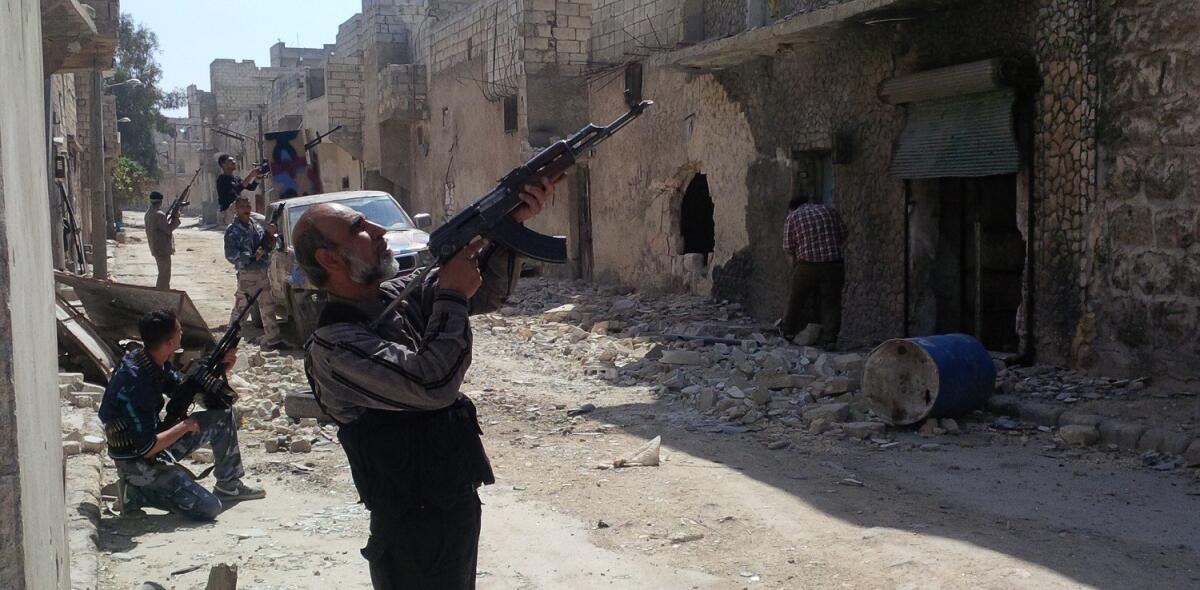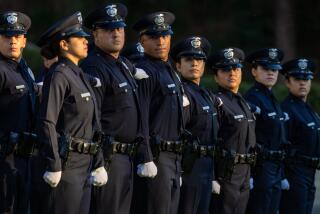In Syria, rebels face challenges in policing areas they control

The informant began to beg as soon as he was pulled from the police truck, which was painted hot pink, blue and black in a poor attempt at military camouflage.
“Where are their places?” officer Abdullah Waisi demanded, holding four arrest warrants for the suspects sought.
In the safety of the police station the accused thief had been willing to give up his fellow criminals. But taken along by heavily armed officers to this busy cobblestone street in the historic Bab al Hadid neighborhood of Aleppo’s Old City, he was clearly scared.
“I don’t know, I don’t know,” the man whined, holding his head and cowering as an officer grabbed him by the arm. Around them militia police fanned out, rifles aimed at a five-story building, ready to raid one of the apartments.
“It’s not perfect, but God willing it is a good beginning,” Ahmad Istaini, a former factory worker turned rebel turned police commander, said of the nascent force at work in opposition-held Aleppo.
Not long after Syrian opposition fighters began seizing control of entire neighborhoods and towns, they established administrative councils and courts to impose a measure of order in lawless locales. Of late they have begun forming civilian police forces as the latest step in creating a civil society even as the Syrian conflict drags on into a fourth year.
The policing efforts face some of the same shortcomings that have beset the fragmented opposition’s attempts at self-government: lack of experience and funds, questions of legitimacy and conflicts between competing rebel groups.
But as one man involved in Aleppo’s law enforcement noted, “If we disappeared for 10 days, Aleppo would become a jungle.”
The large swaths of Syria under the control of myriad opposition factions have become fertile ground for criminals taking advantage of a law-and-order vacuum.
“These days there is no security among people, and everyone is armed and everyone is claiming they are with the [opposition] Free Syrian Army,” said Mudaar Najjar, who heads the security establishment for the rebel Islamic Front, which includes the militia police. “These are people who were originally criminals.”
Even as forces loyal to President Bashar Assad recapture key parts of the country, rebels continue their struggle for independence and self-governance in areas they control.
“We are trying to do the same work as the regime,” said Ali Abu Hussein, who heads the militia police, before quickly correcting himself: “Not like the regime, like a government. Building a country that is safe and modern.”
The Islamic Front’s militia police force was established in 2012, before the newer civilian forces, as rebels first entered the city of Aleppo and the new territory saw an increase in crime among opposition fighters.
Until this year, the police force dealt mostly with crimes committed by rebels. Then the extremist Islamic State, an Al Qaeda breakaway group, withdrew from Aleppo and much of the surrounding countryside.
Through brutal tactics, the group’s fighters had cracked down on anything they deemed un-Islamic, including theft and kidnapping. They routinely executed accused criminals or cut off their hands in town squares.
Initially, residents welcomed this security enforcement from the group known at the time as the Islamic State of Iraq and Syria, or ISIS. But they soon began to chafe under harsh laws that banned various things, such as smoking and music.
“After ISIS pulled out, some of these criminal gangs returned,” said Najjar, who owned a cellphone shop before the uprising. “But we are ready for them. We don’t have the experience or knowledge; we are learning as we go.”
In deserted Aleppo neighborhoods, from which residents have fled as a result of the government’s airstrikes, the opposition police officers conduct nightly patrols to discourage thieves from raiding empty homes and businesses or attacking remaining civilians. They also find themselves increasingly having to resolve disputes among neighbors and even families.
The militia police had already established a legal system to prosecute rebels and are now developing one specific to civilian matters under the guidance of criminal attorneys and experts in sharia, or Islamic law, said Abu Hussein, a former agricultural engineer.
But the expansion has been met with criticism that the rebels have no business policing civilians.
Abu Hussein didn’t want his full name published for fear that he and others could face international prosecution once the conflict ends. He acknowledged that they commit some violations, possibly including blindfolding defendants during interrogations and making them kneel on the floor.
Days before, a man had been arrested for attacking guards at the opposition police headquarters with a knife. Even after being thrown into one of six detention cells — classrooms retrofitted with thick metal doors — the man refused to stop screaming.
In response, one of the judges ordered the man whipped repeatedly, Abu Hussein said.
“Are we up to the responsibility?” he said. “No, not for civilian or military matters, but we work within our abilities.”
Syria’s opposition has been marked by competing and redundant efforts from the battlefield to civil administration, each rebel force claiming to be more effective and more honest than the others. When the militia police became involved in civilian criminal matters, it did so after accusing the local opposition sharia committee, which had already set up a court system and police, of taking bribes and losing the public trust.
Yaser Ataee, the committee spokesman, acknowledged that there had been some corrupt officials but insisted that the institution, which also oversees water and electricity utilities in opposition-held areas, had been reformed.
“The rebels should leave the civilian matters to us and go fight on the front lines,” he said. “If every side makes its own police force then there will be chaos.”
In addition to the Islamic Front, other rebel groups have formed their own police force. Most recently there has been a renewed push for a civilian police department with funding from Western countries funneled through the Syrian National Coalition, the political umbrella group based outside Syria.
But that civilian force, the Free Aleppo Police, has struggled to gain authority, surrounded as it is by better-armed rebel groups. In addition, the Syrian National Coalition is largely dismissed inside the country as a Western-controlled organization dominated by expatriates.
In one small town near the Turkish border, the Free Aleppo Police set up a police station, only to be quickly raided by residents and rebel groups and banished, an Aleppo-based lawyer said. The police force met with similar fates in surrounding towns.
The Free Aleppo Police, which draws its ranks mostly from officers who defected from the government, must contend with Syrian law enforcement’s reputation for corruption. And like other opposition projects orchestrated from abroad, its chances for success could be undermined by financial assistance that is fickle and often compared to the output of an eyedropper.
“The Free Police needs the funding that meets their needs, and secondly they need the opportunity to prove themselves,” said Maher Nana, a family practice doctor in Florida and an unofficial liaison between the Aleppo police force and the coalition.
The department has been given new uniforms, and began receiving money during the spring for salaries, which range from $100 to $300 a month, depending on rank. Since May, 14 patrol cars have been delivered for the entire province of Aleppo. About 80 laptop computers were provided, along with a few scanners and printers.
Most notably, the force lacks a key tool: guns. Western backers will provide nonlethal aid but draw the line at supplying weapons.
“I tell them, ‘Are there police in the world who don’t have weapons?’” said Brig. Gen. Adeeb Shallaf, who commands the provincial force. “But in the end I can’t say anything but thank you for what they have given us.”
What few weapons the force wields are members’ personal handguns, shotguns and Kalashnikovs.
Among the 1,300 officers spread out in 60 police stations, that amounts to a total of 120 firearms.
More to Read
Start your day right
Sign up for Essential California for news, features and recommendations from the L.A. Times and beyond in your inbox six days a week.
You may occasionally receive promotional content from the Los Angeles Times.







